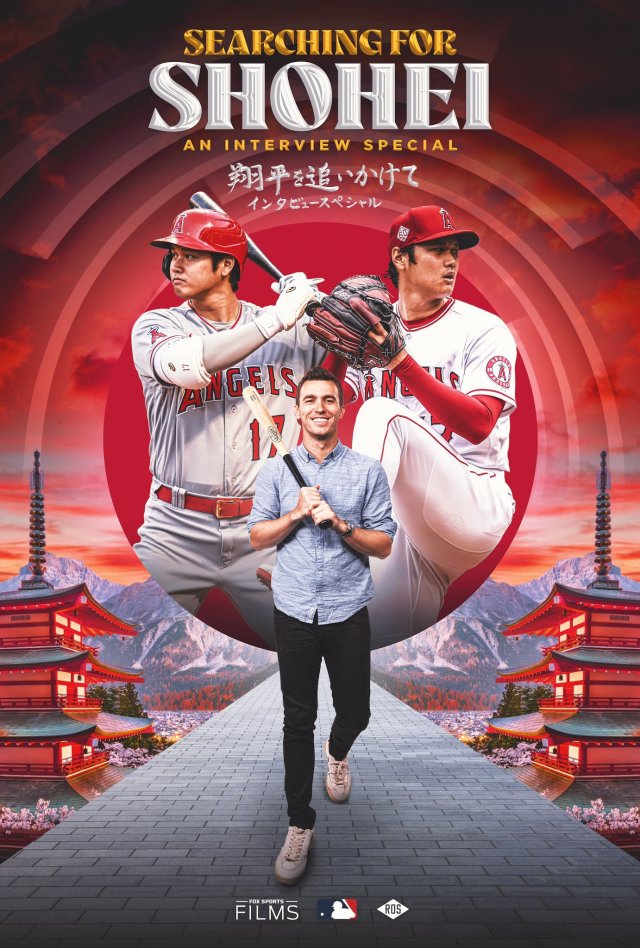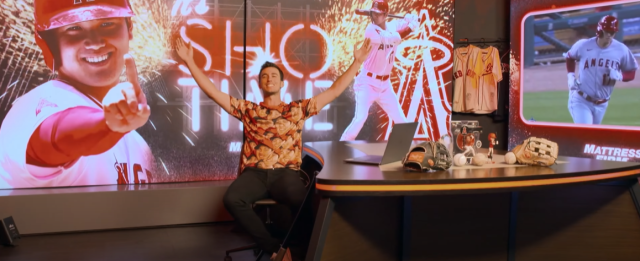
Ohtani’s pull is so huge that even his most outspoken fan in the U.S. finds fame in Japan.
It’s hard to find a bigger name in baseball than Shohei Ohtani. A tremendous talent as a teen, Ohtani has surpassed even those expectations by becoming a high-performance two-way player in both Nippon Professional Baseball and Major League Baseball. It’s no small feat to become either a great hitter or a great pitcher in the MLB, but to become both at the same time at Ohtani’s level hasn’t really been seen since Babe Ruth nearly a century ago.
And it doesn’t even stop there. For someone to have such a talent for baseball, you’d expect and even forgive them for having a bit of an ego, but again and again, we hear stories of Ohtani’s generosity and manners. In Japan, this has made the 28-year-old more than just a great baseball player, he’s a role model and representative of the entire country.
To show just how true this is, I present Exhibit A: Ben Verlander.
As you might have guessed from the T-shirt bearing a mosaic of Ohtani faces, he’s easily the most outspoken booster of the Japanese star among American sportscasters. As an analyst on Fox Sports, on his podcast Flipping Bats, and on social media, Verlander unfalteringly highlights Ohtani’s achievements. And for that, he has earned the appreciation of Ohtani fans in Japan and more.
I was able to talk with Verlander about this sudden fame from far away and where it led.
– So, you’re pretty big in Japan. You’re kind of like the Bon Jovi of sports here.
Ben Verlander: It was wild to experience and I didn’t know I’d get the reception that I did. It made a trip that was already going to be special just really cool.
– Yeah, you’re a known guy here. Was it a surprise to find out about this popularity you had?
Verlander: Absolutely. I knew I wanted to go to Japan to figure out more about the game of baseball in Japan and Shohei’s journey. And for the last year, I got messages from people there saying, ‘Hey, you should come over to Japan.’ But never could I have imagined that I was going to get the response that I did. It was truly remarkable and something I’ll remember forever.
▼ Verlander meets his fans outside the Tokyo Dome
– And what’s amazing is that I think your podcast Flipping Bats, was number one in Japan…and that’s an English-language podcast!
Verlander: That happened while I was there. It was the number one baseball podcast in Japan for a lot of last year and a lot of this year, but while I was in Japan it became the number one podcast for all of sports! And it was so cool to see because you’re right, you’re scrolling through the top podcasts and…mine’s in English?! That just goes to show the appreciation and love and respect that’s going on all around there. I have so much respect for everybody in Japan and I know that there’s a lot of respect in return.
This attention and adoration from the Japanese public also got the attention of Ohtani himself and led to the creation of Searching for Shohei, a documentary produced by Religion of Sports in which Verlander travels to Japan to explore Ohtani’s roots, including visits to his little league team and Higashi Hanamaki High School in Iwate Prefecture.
▼ Verlander hangs out with some Japanese little leaguers
– So you came down to Japan for 10 days to prepare for the interview. Was it really busy or did you have time to just relax and enjoy Japan?
Verlander: I was busy pretty much the whole time. Not a lot of downtime to relax, but what I was doing was pretty much sightseeing anyway, you know? I got to see a lot of different parts of Japan; some big cities like Tokyo and areas that weren’t such big cities in Iwate and Hokkaido. It was all so cool to see.
– Did you get to try any of the food?
Verlander: That was one of the highlights! The food was incredible and I had probably the best ramen of my life. I don’t remember the name of the place but it was just inside a train station in Tokyo. I had so much sushi. The food was incredible, absolutely.
– You got to visit all of Ohtani’s old schools and training grounds, so you probably got a good sense of how Japanese students train and prepare to play baseball. What would you say is the biggest difference between the Japanese style and the American style since you have firsthand experience with that too?
Verlander: I think it’s the amount of work that is done. And I do think that people work hard at baseball over here. I know for a fact they do, but it’s just different in Japan. The amount of work that goes from the second you wake up to the second you go to sleep. I’ve never seen anything like it, especially at the high school that Shohei went to in Hanamaki Higashi. It was remarkable to see that. The work ethic is above and beyond what I’ve seen, and I’ve seen some hardworking places. So, I definitely understand why it translates for Shohei and why he is where he is, in part because of his incredible work ethic.
– And I think it has to do with attitude too. I think that kind of rigorous training helps get their character up.
Verlander: Yeah, 100 percent, and I think one of the things that stuck out to me when I was at his high school was that in the middle of the game everyone comes out and rakes the field, and they do all of this hard work during the game. It definitely translates to the person we see on the field today with Shohei, there’s been multiple clips we’ve seen of him going out of his way to pick up trash if it’s on the field or in the dugout. That’s just who he is, and diving more into his background showed me that.
Searching for Shohei also features a rare hour-long, one-on-one interview with the MLB great in which Verlander, who was a two-way player himself, asks Ohtani about his path to the MLB and shows us just how improbable a rise it really was.
– So with the help of Japanese fans and Religion of Sports you finally get to talk to Shohei Ohtani, and obviously you’re a huge Shohei Ohtani fan. What did you want to ask him the most? What was your dream question?
Verlander: For me, the dream question, came from the reason that I’m as big of a fan that I am because of the whole two-way thing. I was a two-way guy in college and realized at that time that it was impossible. I would have said that it was impossible to do at the big-league level. And then when I was playing professional baseball is when I started hearing about him. I knew some friends that played in Japan so I started following his career and realizing what he was doing. And for me, it all came in the preparation. That’s what I was so intrigued by, so to be able to ask him about his preparation for being a two-way guy and how that translated when he came to America was the question that I was most interested in asking.
– Do you feel he’s respected enough in the U.S.?
Verlander: Respected enough? Yes. But understood? Like people being able to grasp just what we’re watching and seeing? I don’t think we do, no. That’s my goal, is to try and make people understand that this isn’t just a guy that pitches really well and hits really well. There’s so much that goes into that, and we’re seeing one of the greatest players of all time and we’ve certainly seen the best two-year stretch that we’ve ever seen in baseball. I don’t think you can talk about it too much. If anyone can talk about it too much, it’d be me, and I don’t think I’ve talked about it too much.
– On that note too, what do you think about MVP this year?
Verlander: Well, I think it’s Shohei, and I think that’s the important discussion here. If he’s doing THIS, he’s the most valuable player. It’s not because he’s pitching and hitting. If he pitched and had a 4.5 ERA every year, hit 12 home runs, and hit .250, I wouldn’t say that. But I think with what he’s doing now, there is no more valuable player on the planet and I don’t particularly think it’s close. I think there’s a good chance Aaron Judge does end up winning this year, but it’s going to take a year like Aaron Judge had to even be considered beating Shohei, but there’s just not a world in which I can be convinced that there is a player more valuable for what he does on both sides of the ball. He’s doing it all from one roster spot, giving you even more room on your roster to add somebody else. There’s value in that in itself I could go on for hours about why I think it’s Shohei. I’m hopeful he wins.
▼ Ohtani already received the Angels’ MVP, but the American League MVP announcement will be made after the World Series
Shohei Ohtani was just named the @Angels Team MVP AND the Nick Adenhart Award Winner for being the team’s best pitcher.
— Ben Verlander (@BenVerlander) October 2, 2022
( 🎥 - @BallySportWest )
pic.twitter.com/52GC7abqAP
– On the topic of value, people have been talking about possible future teams. Do you think he’ll change teams?
Verlander: You know, I don’t know, and I don’t even think Shohei knows, to be honest with you. There’s a lot of question marks around the Angles organization, including ownership. And when he gets free agency I still don’t think he knows. He’s been vocal that he wants to win. That’s what he wants to do and right now the Angels aren’t a winning organization, but with a lot of change seemingly coming, that could all change.
– What team do you think would be the best fit for Ohtani?
Verlander: Ha, man! Every other team. How do you not want a guy like Shohei?
– But for Ohtani’s sake what do you think would be his best choice?
Verlander: Oh for Ohtani’s sake? I think there is a degree of Shohei wanting the Angels to be that team. He has stayed committed to them. He has done everything in his power to be with them, and I think he wants to win with the Angels. I think that’s his goal, but if he were going to move on, then I think the better fits would be here on the West Coast just because of the time zone difference between here and Japan. I think that was part of his reason for being in Anaheim, so more people in Japan could watch his games. I don’t know if the Mariners are a possibility because of the whole Ichiro thing. I don’t know if that makes him want to stay away so he doesn’t step on his legacy, or makes him want to go there so he can be more involved where Ichiro was involved. I think it’s going to be somewhere west coast and whether it be the Angels or Mariners or Padres or Dodgers, I think those are the better options.
– Thank you, and I have just one more question, and this is kind of a difficult question but I got to ask you: What is Ohtani’s biggest flaw as a baseball player?
Verlander: Biggest flaw as a baseball player… Oh man, this is tough… You know, I would have said before this year, that he has this stuff as a pitcher and needed to work on command a little bit but he figured that out this year. So, I think whenever a flaw appears, he figures it out. I could sit here and tell you last year that this was a flaw, and he figures it out. I could sit here this year when he was pitching and say this is one thing he could work on, and he figures it out. I remember at the All-Star break I don’t think he was very pleased with his hitting. He figured that out. He can see a flaw of his and fix it and he does that better than anybody else that I’ve ever seen on both sides of the ball. It’s remarkable so I truly don’t think there’s a flaw in his game right now. I know he can be better and he’ll tell you that his goal is to get better and better and better, but the sky’s the limit and I promise you he’s figuring out a way to be better right now and that’s what makes him so special.
– I think that goes right back to the training aspect from school. It’s so rigorous and so hard that the players sort of lose that ego and that sense of self that they just commit themselves to improve and that’s how you survive in Japanese baseball.
Verlander: Absolutely, I was talking to Mr. Kuriyama, his manager in Japan for this interview special and he said one year they’d won the championship and on Christmas, Shohei sends him a video of him hitting in the cage and saying “a Christmas present to you.” While everybody else was celebrating and just having fun, Shohei was just hitting in a cage. That is fun for him and he’s doing it differently from everybody else. You can point to the high school and the work ethic for everybody else, but Shohei’s not even on that level. Shohei’s got a work ethic different from everybody else which is why he’s here.”
▼ Ben talks with Hideki Kuriyama about Ohtani’s time with the Nippon-Ham Fighters
The interview with Mr. Kuriyama is one of many in Searching for Shohei, which you can tell was made by someone with a genuine passion for the subject. However, the one setback up to this point is that the show still cannot be seen in Japan where it would in all likelihood be very well received if Verlander’s journey up to this point is any indication.
– By the way, how can people check out the documentary here in Japan?
Verlander: The goal for me has been to get it visible to everybody in Japan as fast as possible, and it is going to be available on digital platforms soon, the Fox Sports app, FoxSports.com, and all that stuff. The plan as of right now is 18 November so I’m hopeful. And I will certainly be tweeting it out as soon as I can for everybody to see it.
– Yeah, I think they’re looking forward to it here.
Verlander: Yeah, this doesn’t happen without the fans there, the people there that listen to my podcast. So for me it’s been really special having this out in America and for people to see it, but my goal is for people there to see it because they’ve been a bigger part of this than anybody else. It’s been hard for me that they haven’t been able to see this but very very soon it will be happening and I am so excited to see the response and to share with everybody what we’ve been working on.
– Yeah, it’s quite good. It’s a good combination that was very moving in parts but also a good analysis of Ohtani’s history.
Verlander: Thanks, I appreciate that.
Religion of Sports’ Searching for Shohei is a nice glimpse not just into Ohtani’s background but life in Japan itself and a fun watch for anyone interested in the culture even without knowing a whole lot about baseball. Hopefully, it will arrive in Japan soon and hopefully, Verlander can come back to hear what people thought of it here and maybe even get some time to enjoy some more food.
Images: ©Flipping Bats
● Want to hear about SoraNews24’s latest articles as soon as they’re published? Follow us on Facebook and Twitter!


 Shohei Ohtani amazes Major League Baseball with his impeccable Japanese manners
Shohei Ohtani amazes Major League Baseball with his impeccable Japanese manners Shohei Otomo brings the gritty side of Japan to vivid life with a mere ballpoint pen
Shohei Otomo brings the gritty side of Japan to vivid life with a mere ballpoint pen Student baseball players in Japan improve with less training after COVID-19 hiatus
Student baseball players in Japan improve with less training after COVID-19 hiatus Was there no “Song of 2021” in Japan?
Was there no “Song of 2021” in Japan? Japan’s Kanji of the Year revealed, reflects both the good and the bad of 2022
Japan’s Kanji of the Year revealed, reflects both the good and the bad of 2022 McDonald’s new Happy Meals offer up cute and practical Sanrio lifestyle goods
McDonald’s new Happy Meals offer up cute and practical Sanrio lifestyle goods All-you-can-drink Starbucks and amazing views part of Tokyo’s new 170 meter-high sky lounge
All-you-can-drink Starbucks and amazing views part of Tokyo’s new 170 meter-high sky lounge More foreign tourists than ever before in history visited Japan last month
More foreign tourists than ever before in history visited Japan last month Starbucks reopens at Shibuya Scramble Crossing with new look and design concept
Starbucks reopens at Shibuya Scramble Crossing with new look and design concept Beautiful Sailor Moon manhole cover coasters being given out for free by Tokyo tourist center
Beautiful Sailor Moon manhole cover coasters being given out for free by Tokyo tourist center Mister Donut ready to make hojicha dreams come true in latest collab with Kyoto tea merchant
Mister Donut ready to make hojicha dreams come true in latest collab with Kyoto tea merchant Is the new Shinkansen Train Desk ticket worth it?
Is the new Shinkansen Train Desk ticket worth it? The oldest tunnel in Japan is believed to be haunted, and strange things happen when we go there
The oldest tunnel in Japan is believed to be haunted, and strange things happen when we go there 10 awesome ice creams available from convenience stores in Japan
10 awesome ice creams available from convenience stores in Japan Arrest proves a common Japanese saying about apologies and police
Arrest proves a common Japanese saying about apologies and police Disney princesses get official manga makeovers for Manga Princess Cafe opening in Tokyo
Disney princesses get official manga makeovers for Manga Princess Cafe opening in Tokyo We try out “Chan Ramen”, an underground type of ramen popular in the ramen community
We try out “Chan Ramen”, an underground type of ramen popular in the ramen community Beautiful new Final Fantasy T-shirt collection on the way from Uniqlo【Photos】
Beautiful new Final Fantasy T-shirt collection on the way from Uniqlo【Photos】 Foreign English teachers in Japan pick their favorite Japanese-language phrases【Survey】
Foreign English teachers in Japan pick their favorite Japanese-language phrases【Survey】 There’s a park inside Japan where you can also see Japan inside the park
There’s a park inside Japan where you can also see Japan inside the park Japanese convenience store packs a whole bento into an onigiri rice ball
Japanese convenience store packs a whole bento into an onigiri rice ball Studio Ghibli releases Kiki’s Delivery Service chocolate cake pouches in Japan
Studio Ghibli releases Kiki’s Delivery Service chocolate cake pouches in Japan Japan’s bone-breaking and record-breaking roller coaster is permanently shutting down
Japan’s bone-breaking and record-breaking roller coaster is permanently shutting down New definition of “Japanese whiskey” goes into effect to prevent fakes from fooling overseas buyers
New definition of “Japanese whiskey” goes into effect to prevent fakes from fooling overseas buyers Foreign passenger shoves conductor on one of the last full runs for Japan’s Thunderbird train
Foreign passenger shoves conductor on one of the last full runs for Japan’s Thunderbird train Our Japanese reporter visits Costco in the U.S., finds super American and very Japanese things
Our Japanese reporter visits Costco in the U.S., finds super American and very Japanese things Kyoto bans tourists from geisha alleys in Gion, with fines for those who don’t follow rules
Kyoto bans tourists from geisha alleys in Gion, with fines for those who don’t follow rules Studio Ghibli unveils Mother’s Day gift set that captures the love in My Neighbour Totoro
Studio Ghibli unveils Mother’s Day gift set that captures the love in My Neighbour Totoro Domino’s Japan now sells…pizza ears?
Domino’s Japan now sells…pizza ears? New Japanese KitKat flavour stars Sanrio characters, including Hello Kitty
New Japanese KitKat flavour stars Sanrio characters, including Hello Kitty Sales of Japan’s most convenient train ticket/shopping payment cards suspended indefinitely
Sales of Japan’s most convenient train ticket/shopping payment cards suspended indefinitely Sold-out Studio Ghibli desktop humidifiers are back so Totoro can help you through the dry season
Sold-out Studio Ghibli desktop humidifiers are back so Totoro can help you through the dry season Japanese government to make first change to romanization spelling rules since the 1950s
Japanese government to make first change to romanization spelling rules since the 1950s Ghibli founders Toshio Suzuki and Hayao Miyazaki contribute to Japanese whisky Totoro label design
Ghibli founders Toshio Suzuki and Hayao Miyazaki contribute to Japanese whisky Totoro label design Doraemon found buried at sea as scene from 1993 anime becomes real life【Photos】
Doraemon found buried at sea as scene from 1993 anime becomes real life【Photos】 Tokyo’s most famous Starbucks is closed
Tokyo’s most famous Starbucks is closed One Piece characters’ nationalities revealed, but fans have mixed opinions
One Piece characters’ nationalities revealed, but fans have mixed opinions We asked a Uniqlo employee what four things we should buy and their suggestions didn’t disappoint
We asked a Uniqlo employee what four things we should buy and their suggestions didn’t disappoint Princesses, fruits, and blacksmiths: Study reveals the 30 most unusual family names in Japan
Princesses, fruits, and blacksmiths: Study reveals the 30 most unusual family names in Japan Studio Ghibli’s new desktop Howl’s Moving Castle will take your stationery on an adventure
Studio Ghibli’s new desktop Howl’s Moving Castle will take your stationery on an adventure Downtown Tokyo hotel makes its rooms absolutely free in exchange for one small favor
Downtown Tokyo hotel makes its rooms absolutely free in exchange for one small favor Baseball star Ichiro Suzuki to coach champion high school baseball team in Japan
Baseball star Ichiro Suzuki to coach champion high school baseball team in Japan 10 types of baseball spectators in Korea
10 types of baseball spectators in Korea Modern samurai demonstrates that he could make it in Major League Baseball【Video】
Modern samurai demonstrates that he could make it in Major League Baseball【Video】 J.J. Abrams tells us fan-fav Jedi may make first-ever live-action appearance in Rise of Skywalker
J.J. Abrams tells us fan-fav Jedi may make first-ever live-action appearance in Rise of Skywalker Got a question for Haruki Murakami? Website lets you ask the author directly, and in English, too
Got a question for Haruki Murakami? Website lets you ask the author directly, and in English, too J.J. Abrams sits down for an interview with RocketNews24 about Star Trek, the moviemaking process
J.J. Abrams sits down for an interview with RocketNews24 about Star Trek, the moviemaking process Blogger offers her top four tips for Japanese women dating foreign guys
Blogger offers her top four tips for Japanese women dating foreign guys Confessions of a 46-year-old Japanese male pole dancer
Confessions of a 46-year-old Japanese male pole dancer Five reasons your partner’s political apathy means you’d be better off without them
Five reasons your partner’s political apathy means you’d be better off without them With great power comes the responsibility to interview movie stars: We sit down with Tom Holland
With great power comes the responsibility to interview movie stars: We sit down with Tom Holland We talk to Matt Damon in Tokyo about films, Tommy Lee Jones and how to be cool like Jason Bourne
We talk to Matt Damon in Tokyo about films, Tommy Lee Jones and how to be cool like Jason Bourne Japan’s kanji character of the year for 2017 is “north”
Japan’s kanji character of the year for 2017 is “north” We interview Jurassic World: Fallen Kingdom stars Chris Pratt and Bryce Dallas Howard in Japan
We interview Jurassic World: Fallen Kingdom stars Chris Pratt and Bryce Dallas Howard in Japan Twitter manga shows why “Quit your job” isn’t such an easy solution for suicidal workers in Japan
Twitter manga shows why “Quit your job” isn’t such an easy solution for suicidal workers in Japan
Leave a Reply